Common Connection Errors / Solutions Error 645: Internal Authentication Error There may be a problem with your network configuration or a new incompatibility between your modem and upgraded modems on the access number you are using. The following instructions should help you optimize your configuration for use with BlueLight Internet. A. Is your modem configured correctly? To check your modem settings, please follow the steps below. - Click on the Windows Start button, point to Settings and select Control Panel.
- Double-click the Modems icon.
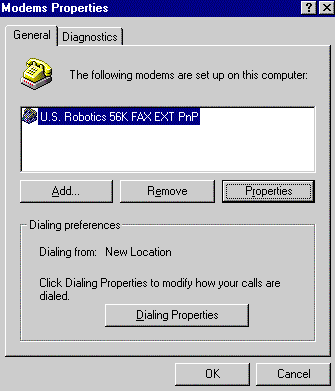
- Click once on the modem that is installed to highlight it and click on the Properties button.
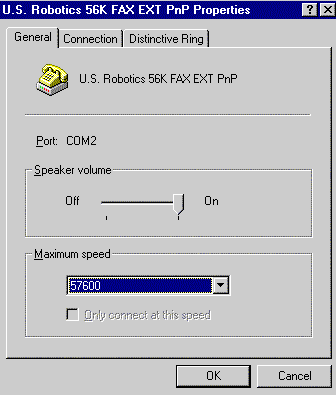
- Select the General tab and look for the Maximum Speed section. Change the settings to match your modem.
A. If you have a 28.8 or 33.6 modem, select 38400.
B. If you have a 56k or Flex modem, select 57600. - Verify that the box for Only connect at this speed is NOT checked.
- Click OK, then OK again and close the Control Panel.
- Double-click the My Computer icon on your desktop.
- Double-click the Dial-Up Networking icon.
- Click once on the BlueLight Internet icon to highlight it. From the File menu, select Properties.
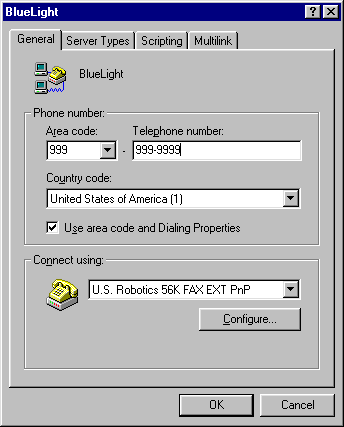
- Ensure the correct modem is selected in the Connect using drop-down menu.
- Click on the Configure button.
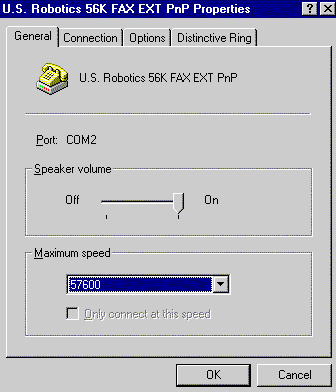
- Select the General tab and look for the Maximum Speed section. Change the settings to match your modem.
A. If you have a 28.8 or 33.6 modem, select 38400.
B. If you have a 56k or Flex modem, select 57600. - Verify that the box for Only connect at this speed is NOT checked.
- Click OK, then OK again to close Dial-Up Networking.
B. Are you running Windows 95? If you are running Windows 95, check to see what version you have. If you have an older version, you may need to download the latest version of Dial-Up Networking (version 1.3). To check what version of Windows 95 you are running, please follow these steps: - Click the Windows Start button, point to Settings and select Control Panel.
- Double-click the System icon and select the General tab.

- Under System, you will see listed the Operating System, Edition and version number. The version number will start with 4.00.950. Check to see if a B or C is listed after 4.00.950. If not, you will need to download and install Dial-Up Networking 1.3. Click here to download it.
If there is no letter at all after 4.00.950, then we suggest you also download and install Service Pack 1 for Windows 95. You can download it by clicking here.
Note: You must scroll down to the Service Packs section.
C. Check your network settings - Click the Windows Start button, point to Settings and select Control Panel.
- Double-click the Network icon.
IMPORTANT! Before making any changes to your Network settings, please ensure that you have your Windows CD.

- Remove Dial-Up Adapter, Client for Microsoft Networks, and Microsoft Family Logon by highlighting each one and clicking on the Remove button.
- Once all of these have been removed, click OK.
- You may be asked for your Windows CD. Insert it into your CD-ROM drive and click OK.

- When you are asked to reboot, click YES.
- Click the Windows Start button, point to Settings and select Control Panel.
- Double-click the Network icon.

Note: Check to see if you have the following components:
Client For Microsoft Networks
TCP/IP or TCP/IP > Dial Up Adapter
Dial-Up Adapter
If you are on a Network or company LAN, contact your system administrator before making any network changes. If the components listed above are not present, then you will need to add the missing component(s). If all of the components are listed, skip to the Verify Network Settings section below.
IMPORTANT! Only add a component if it is not already present. If the component is listed, you will not need to add it.
To Add Client for Microsoft Networks: 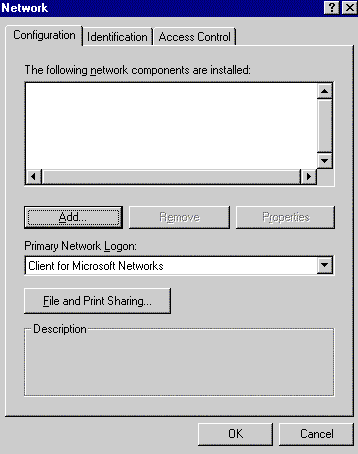 - Click on the Add button.
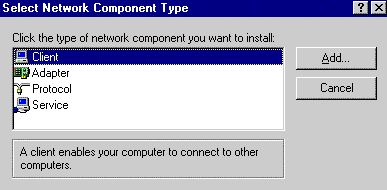 - Select Client.
- Click on the Add button.
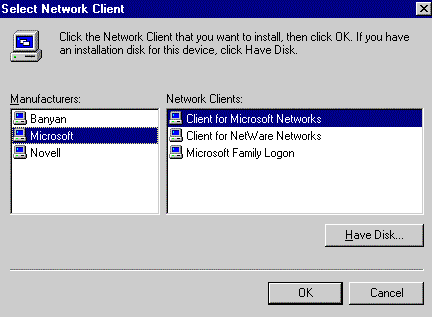 - Under Manufacturers, select Microsoft.
- Under Network Clients, select Client for Microsoft Networks.
- Click OK.
To Add TCP/IP: - Click on the Add button.
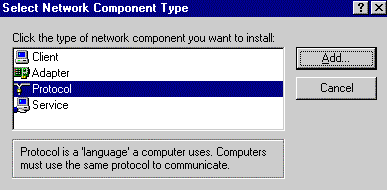 - Select Protocol.
- Click on the Add button.
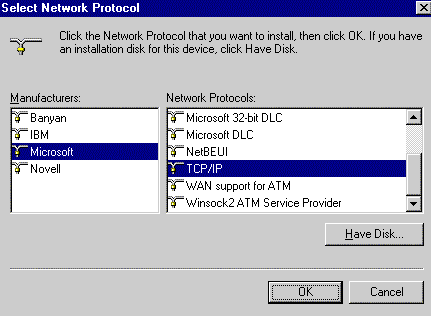 - Under Manufacturers, select Microsoft.
- Under Network Protocols, select TCP/IP.
- Click OK.
Once you have confirmed that the three required Network components are installed, ensure that TCP/IP is correctly configured. To Add Dial-up Adapter: - Click on the Add button.
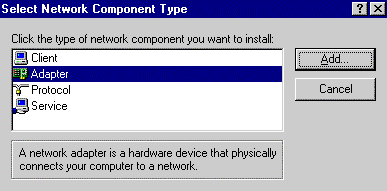 - Select Adapter.
- Click on the Add button.
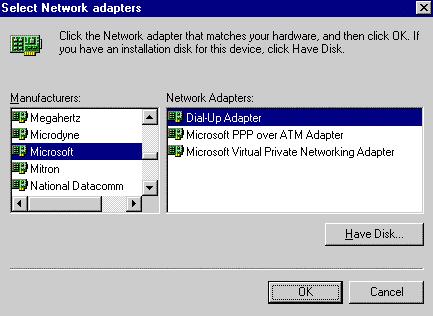 - Under Manufacturers, select Microsoft.
- Under Network Adapters, select Dial-Up Adapter.
- Click OK.
D. Verify your network settings Once you've added any necessary components, follow these steps: - Click once on TCP/IP to highlight it and click on the Properties button.
 - Select the DNS Configuration tab and make sure that Disable DNS is checked.
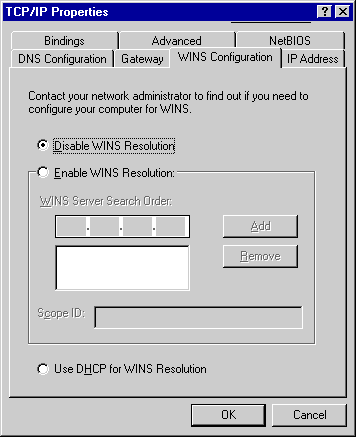 - Select the WINS Configuration tab and ensure that Disable WINS Resolution is checked.
- Click OK.
 - In the Primary Network Logon field, ensure that Client for Microsoft Networks is selected.
- Click OK.
- When prompted to restart your computer, click OK.
- Retry your BlueLight Internet connection.
E. Change access numbers Your connection may have been dropped due to technical difficulties with the access number you are using. Try connecting to BlueLight Internet again. If the problem persists, try using another access number in your area. For instructions on how to change your access number please click here
F. Verify your Windows version - Click the Windows Start button and select Settings.
- Click Control Panel and select System.
- The Windows version and build will be shown under the General tab.
| |
